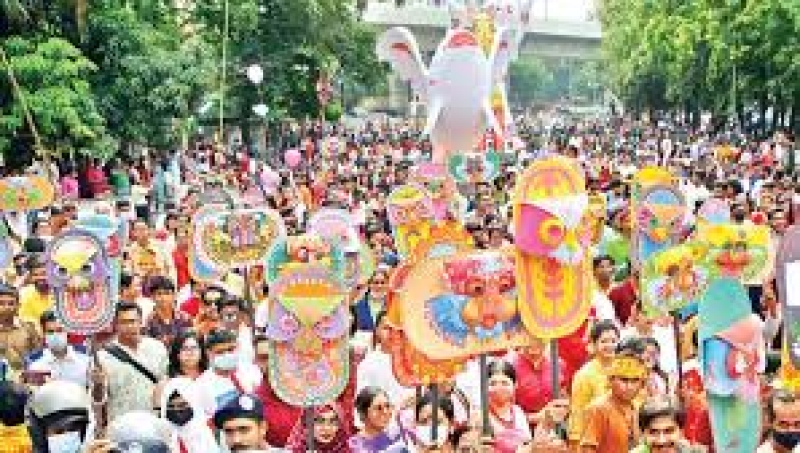- Puppet show enchants Children as Boi Mela comes alive on day 2 |
- DSCC Admin Salam’s drive to make South Dhaka a ‘clean city’ |
- 274 Taliban Dead, 55 Pakistan Troops Killed |
- Now 'open war' with Afghanistan after latest strikes |
- Dhaka's air quality fourth worst in world on Friday morning |
Govt to Celebrate Pahela Baishakh Inclusively This Year

This year, the government will celebrate Pahela Baishakh, the first day of the Bangla New Year, in an inclusive manner, involving people from all ethnic communities. The plans were finalized in an inter-ministerial meeting held on March 23 at the Ministry of Cultural Affairs in Dhaka.
The government aims to not only mark the Bangla New Year 1432 but also recognize the New Years of other ethnic groups, including the Chakma, Marma, Tripura, and Garo communities. This initiative will be the first national-level inclusive celebration of its kind.
Cultural Affairs Adviser Mostofa Sarwar Farooki chaired the meeting, which outlined the participation of various ministries, divisions, educational institutions, and cultural organizations in the festivities. The Ministry of Information and Broadcasting will coordinate media coverage, ensuring extensive reports across print, television, and radio outlets.
Inclusive Celebrations and Cultural Activities
This year’s celebrations will begin with the mandatory performance of the national anthem and the song "Esho He Boishakh, Esho Esho" on the morning of Pahela Baishakh. The Faculty of Fine Arts at Dhaka University will once again organize a grand procession, but this time, it will be more inclusive, showcasing the diverse cultural identities of various ethnic groups through music, traditional instruments, and performances.
In addition, the Bangladesh Shilpakala Academy will help coordinate the participation of cultural groups from the hill districts and other ethnic communities. The procession will be broadcast live across all media platforms, including government and private TV channels, radio stations, and community radios.
Cultural Programs Nationwide
On the occasion, various cultural organizations such as the Chhayanaut and Shurer Dhara will host events, with Chhayanaut's famous Ramna Batamul performance marking the dawn of the new year. Colorful processions and cultural programs will take place nationwide, with local administrations organizing traditional fairs, essay competitions, and cultural performances.
Educational institutions across the country will also hold their own Pahela Baishakh celebrations, adding to the nationwide festive spirit. Additionally, the Bangla Academy and BSCIC will organize a weeklong Bashakhi fair, while the Bangladesh Folk Art and Crafts Foundation will hold a traditional fair in the capital.
Traditional Meals and Events for All
To spread the festive cheer, traditional Bangla foods will be served to prisoners, hospital patients, and children in orphanages. Children in these homes will also participate in cultural performances. In addition, an exhibition of products made by prisoners will be held.
Bangladesh missions abroad will organize special events to celebrate the Bangla New Year, and all museums and archaeological sites will remain open to the public, with free entry for children, students, and individuals with disabilities.
Safety and Accessibility Measures
Security arrangements will be handled by law enforcement agencies at all levels, ensuring safe and unhindered access to the events. Fire safety and medical services will be provided, and mobile toilets will be set up at key locations like Suhrawardy Udyan and Ramna Park.
Social media and religious institutions will help promote the cultural heritage of Pahela Baishakh. The government has also taken measures to ensure that no gambling or inappropriate activities occur at the local fairs.
Major Cultural Events
On April 12, 2025, a procession from the three hill districts will converge at Ramna Park for a flower-floating ceremony. A Chaitra Sankranti concert at Suhrawardy Udyan will feature performances by popular bands like Miles, Warfaze, Dalchhut, and others.
A National Celebration
Pahela Baishakh is one of the most vibrant festivals in Bangladesh, where people from all walks of life dress in traditional attire to welcome the New Year. Women traditionally wear white sarees with red borders, while men sport white pyjamas and kurtas.
This year’s celebration promises to be a grand and inclusive event, bringing together the diverse cultural identities of Bangladesh under one joyful occasion.

